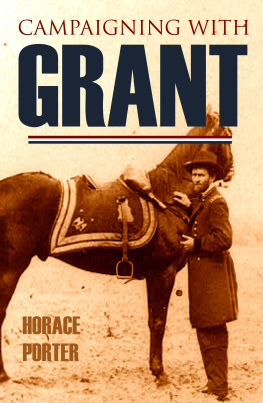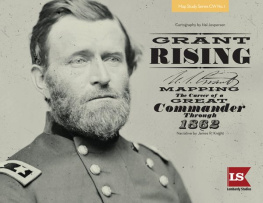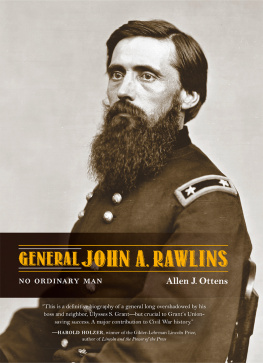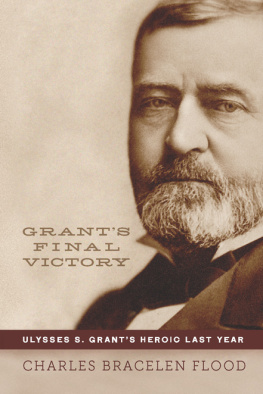
CAMPAIGNING WITH GRANT
ULYSSES S. GRANT AS LIEUTENANT-GENERAL
BY
GENERAL HORACE PORTER, LL.D.
COPYRIGHT 2016 BIG BYTE BOOKS
Discover more lost history from BIG BYTE BOOKS
Get your FREE EBOOK join our mailing list to get notified of great new (old) books and the latest blog posts.
BIG BYTE BOOKS is your source for great lost history!
TO MY COMRADES OF THE UNION ARMY AND NAVY, WHOSE VALOR SAVED THE REPUBLIC, THIS BOOK IS RESPECTFULLY DEDICATED.
PREFACE
THE object aimed at in this narrative is to recount the daily acts of General Grant in the field, to describe minutely his personal traits and habits, and to explain the motives which actuated him in important crises by giving his criticisms upon events in the language employed by him at the time they took place.
The chief effort of the author has been to enable readers to view the Union commander nearby, and to bring them into such intimate contact with him that they may know him as familiarly as those who served by his side. It has been no part of the authors purpose to give a detailed history of the campaigns referred to, but to describe the military movements only so far as necessary to show General Grants intentions and plans and the general results of his operations. Mention of particular commands, subordinate commanders, and topographical features, therefore, had to be in large measure omitted.
While serving as a personal aid to the general-in-chief the author early acquired the habit of making careful and elaborate notes of everything of interest which came under his observation, and these reminiscences are simply a transcript of memoranda jotted down at the time.
The Author.
CHAPTER I
WHILE sitting in my quarters in the little town of Chattanooga, Tennessee, about an hour after nightfall, Friday, October 23, 1863, an orderly brought me a message from General George H. Thomas, Commander of the Army of the Cumberland, on whose staff I was serving, summoning me to headquarters. A storm had been raging for two days, and a chilling rain was still falling. A few minutes walk brought me to the plain wooden, one-story dwelling occupied by the commander, which was situated on Walnut street, near Fourth, and upon my arrival I found him in the front room on the left side of the hall, with three members of his staff and several strange officers. In an arm-chair facing the fireplace was seated a general officer, slight in figure and of medium stature, whose face bore an expression of weariness. He was carelessly dressed, and his uniform coat was unbuttoned and thrown back from his chest. He held a lighted cigar in his mouth, and sat in a stooping posture, with his head bent slightly forward. His clothes were wet, and his trousers and top-boots were spattered with mud. General Thomas approached this officer, and, turning to me and mentioning me by name, said, I want to present you to General Grant. Thereupon the officer seated in the chair, without changing his position, glanced up, extended his arm to its full length, shook hands, and said in a low voice, and speaking slowly, How do you do? This was my first meeting with the man with whom I was destined afterward to spend so many of the most interesting years of my life.
The strange officers present were members of General Grants staff. Charles A. Dana, Assistant Secretary of War, who had been for some time with the Army of the Cumberland, had also entered the room. The next morning he sent a despatch to the War Department, beginning with the words, Grant arrived last night, wet, dirty, and well.
On the 19th of October General Grants command had been enlarged so as to cover the newly created military division of the Mississippi, embracing nearly the entire field of operations between the Alleghanies and the Mississippi River, and the Army of the Cumberland had thus been placed under his control. About a month before, that army, after having fought at Chickamauga one of the most gallantly contested and sanguinary battles in the annals of warfare, had fallen back and taken up a defensive position on the south side of the Tennessee River, inclosing within its lines the village of Chattanooga. The opposing forces, under General Bragg, had invested this position, and established such a close siege that the lines of supply had been virtually cut off, rations and forage were about exhausted, and almost the last tree-stump had been used for fuel. Most of the men were without overcoats, and some without shoes; ten thousand animals had died of starvation, and the gloom and despondency had been increased by the approach of cold weather and the appearance of the autumn storms.
General Grant, upon assuming the responsibilities of his new command, had fully realized the critical condition of the Army of the Cumberland, and had set out at once for its headquarters to take charge in person of its future operations. On his way to the front he had telegraphed General Thomas, from Louisville, to hold Chattanooga at all hazards, to which that intrepid soldier made the famous reply, I will hold the town till we starve.
General Grant had started, the day before the incident I have described, from Bridgeport, a place thirty miles below Chattanooga, where the Nashville and Chattanooga Railroad crosses the Tennessee River, and had ridden by way of Waldens Ridge, the only route left open by which communication could be had with the beleaguered town. We had been advised that he was on his way, but hardly expected that he would reach Chattanooga that night, considering the state of the weather, the wretched condition of the roads, or rather bridle-paths, over the mountain, and the severe injury to his leg which had been caused by a fall of his horse several weeks before, and from which he was still suffering. When he arrived he had to be lifted from his saddle, and was evidently experiencing much pain, as his horse had slipped in coming down the mountain, and had further injured the lame leg; but the general showed less signs of fatigue than might have been supposed after his hard ride of two days under such trying circumstances.
As soon as General Grant had partaken of a light supper immediately after his arrival, General Thomas had sent for several general officers and most of the members of his staff to come to headquarters, and the room soon contained an exceedingly interesting group. A member of General Thomass staff quietly called that officers attention to the fact that the distinguished guests clothes were pretty wet and his boots were thoroughly soaked with rain after his long ride through the storm, and intimated that colds were usually no respecters of persons. General Thomass mind had been so intent upon receiving the commander, and arranging for a conference of officers, that he had entirely overlooked his guests travel-stained condition; but as soon as his attention was called to it, all of his old-time Virginia hospitality was aroused, and he at once begged his newly arrived chief to step into a bedroom and change his clothes. His urgings, however, were in vain. The general thanked him politely, but positively declined to make any additions to his personal comfort, except to light a fresh cigar. Afterward, however, he consented to draw his chair nearer to the wood fire which was burning in the chimney-place, and to thrust his feet forward to give his top-boots a chance to dry. The extent of his indulgence in personal comfort in the field did not seem to be much greater than that of bluff old Marshal Suvaroff, who, when he wished to give himself over to an excess of luxury, used to go so far as to take off one spur before going to bed.
At General Grants request, General Thomas, General William F. Smith, his chief engineer, commonly known in the army as Baldy Smith, and others, pointed out on a large map the various positions of the troops, and described the general situation. General Grant sat for some time as immovable as a rock and as silent as the sphinx, but listened attentively to all that was said. After a while he straightened himself up in his chair, his features assumed an air of animation, and in a tone of voice which manifested a deep interest in the discussion, he began to fire whole volleys of questions at the officers present. So intelligent were his inquiries, and so pertinent his suggestions, that he made a profound impression upon everyone by the quickness of his perception and the knowledge which he had already acquired regarding important details of the armys condition. His questions showed from the outset that his mind was dwelling not only upon the prompt opening of a line of supplies, but upon taking the offensive against the enemy. In this he was only manifesting one of his chief military characteristicsan inborn dislike to be thrown upon the defensive. Even when he had to defend a position, his method of warfare was always that of the offensive-defensive.
Next page










